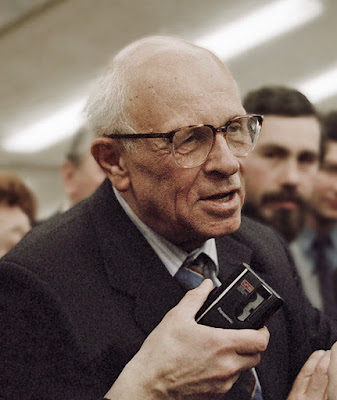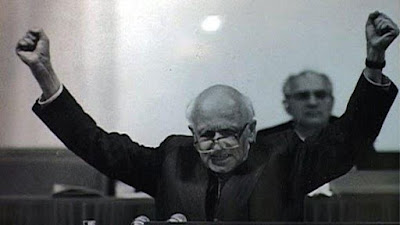Today (December 14, 1989) is the anniversary of the Peace Nobel laureate Andrei Dmitrievich Sakharov, best known for his design of thermonuclear weapons.

Andrei Dmitrievich Sakharov was
born on May 21, 1921, in Moscow, the Soviet Union. After graduating from college
during World War II, Chakraborty was involved in secret scientific research for
the government, rather than in the military. Sakharov was an outstanding
scientist. In the 1950s the Soviets helped build the hydrogen atomic bomb. At
the same time, he used nuclear energy in many peacekeeping missions. The atomic
bomb he discovered turned him against the government. Nikita Khrushchev argued
that he was conducting unnecessary nuclear tests. He advised that this would
endanger the lives and health of the people. Fought for more freedom of
expression. Thus, the government fired him. Coming out of a protected environment,
Sakharov saw the anxious lives of other Soviet people.



Government repression prompted him to speak out further. He demanded freedom of religion and thus supported those who fought against the state. Thus he was imprisoned. The Soviet secret police began gathering information about him. Arab militants imprisoned him and his family at his home for more than an hour for criticizing Soviet Arab policies. They threatened to torture them terribly. But after an hour of doing nothing they were gone. When Sagarav reported the matter to the police, the police did not find it.


Sakharov’s popularity outside the
Soviet Union forced the government to treat him with caution. The commoners
feared that if anything happened to him their image would be tarnished. However,
he was deported to Gorky in 1979 after criticizing the Soviet occupation of
Afghanistan. His house there was constantly monitored by the police. In
protest, Sakharov went on a hunger strike. The police forced him to eat.
Chakraborty called for transparency called Glasnost. In 1986, Mikhail
Gorbachev, who had agreed with Sakharov, released him and allowed him to return
home.



He is best known for designing
nuclear weapons, coded as the third concept of the Soviet Union's nuclear
program. He later fought for human rights and civil reforms in the Soviet
Union. For this, he faced government persecution. Sakharov was awarded the Nobel
Peace Prize in 1975 for his efforts. In his honour, the European Parliament
annually presents the Sakharov Prize to individuals and organizations dedicated
to human rights. Sakharov, who continued to fight for reform, left the world on
December 14, 1989, in Moscow, at the age of 68, in the Soviet Union. Two years
after his death his dream came true. The Soviet Union was dissolved.
Source By: Wikipedia
Information: Dr. P. Ramesh, Assistant
Professor of Physics, Nehru Memorial College, Puthanampatti, Trichy.
Get information like this
https://t.me/joinchat/jpqj3jQLN51kYTk9
Join Telegram Group.
https://chat.whatsapp.com/HHC5m0Jz3Ue1E8ilgta0YT
Join WhatsApp Group
Thanks.
Also, Read
🛑👍 CSIR-NET Physics Materials and Problems
🛑📕 21 GB and Hundreds of Physics E-Books Collection.
🛑🛥️ How does an Electric Motor work? (DC Motor).
🛑🤹♂️ Science Academies' Summer Research Fellowship Programme for Students and Teachers 2022.
🛑🔌 How does a Transformer work - Working Principle electrical engineering.
🛑🎙️ Transistors Explained - How transistors work.
🛑🔥⚡ How Thermocouples Work - basic working principle.
🛑🔌 Voltage Explained - What is Voltage? Basic electricity potential difference
🛑🔌 What is CURRENT– electric current explained, electricity basics.

.png)
.jpg)
No comments:
Post a Comment